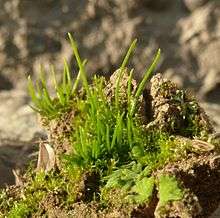Anthoceros agrestis
| Anthoceros agrestis | |
|---|---|
 | |
| Anthoceros agrestis in Schwäbisch-Fränkische Waldberge, Deutschland. | |
| Scientific classification | |
| Kingdom: | Plantae |
| Division: | Anthocerotophyta |
| Class: | Anthocerotopsida |
| Order: | Anthocerotales |
| Family: | Anthocerotaceae |
| Genus: | Anthoceros |
| Species: | A. agrestis |
| Binomial name | |
| Anthoceros agrestis (Paton) Damsholt | |
| Synonyms[1][2][3] | |
| |
Anthoceros agrestis, commonly called field hornwort,[4] is a bryophyte of the Anthoceros genus. It has complicated taxonomies.
Taxonomy

This species of Anthoceros is known for having enzymes like cinnamic acid 4-hydroxylase (EC 1.14.13.11), a cytochrome P450-dependent hydroxylase. Cinnamic acid 4-hydroxylase (C4H; EC 1.14.13.11) is one of the first known plant cytochrome P450 monooxygenases[5] and also one of the best-characterized cytochrome P450 hydroxylases from higher plants.[6][7]
Chemistry
Production of rosmarinic acid and a rosmarinic acid 3'-O-beta-D-glucoside in suspension cultures of this hornwort was also discovered in 2005.[8]
Anthocerodiazonin, an alkaloid, was isolated from in vitro cultures of the species. Also, six glutamic acid amides, N-(4-hydroxybenzoyl)-glutamic acid, N-(3,4-dihydroxybenzoyl)-glutamic acid, N-(4-hydroxy-3-methoxybenzoyl)-glutamic acid, (E)-N-(isoferuloyl)-glutamic acid, (Z)-N-(isoferuloyl)-glutamic acid and (Z)-N-(p-coumaroyl)-glutamic acid were obtained as natural products.[9]
References
- ↑ USDA-Plants profile for Anthoceros agrestis http://plants.usda.gov/java/profile?symbol=ANAGA2
- ↑ http://luirig.altervista.org/schedenam/fnam.php?taxon=Anthoceros+agrestis+var.+agrestis
- ↑ "Archived copy". Archived from the original on 2012-08-26. Retrieved 2010-12-27.
- ↑ Edwards, Sean R. (2012). English Names for British Bryophytes. British Bryological Society Special Volume. 5 (4 ed.). Wootton, Northampton: British Bryological Society. ISBN 978-0-9561310-2-7. ISSN 0268-8034.
- ↑ Russell and Conn 1967, Russell 1971
- ↑ Werck-Reichhardt 1995
- ↑ Petersen, M. (18 January 2003). "Cinnamic acid 4-hydroxylase from cell cultures of the hornwort Anthoceros agrestis". Planta. 217 (1): 96–101. PMID 12721853. doi:10.1007/s00425-002-0960-9. Retrieved 14 November 2002.
- ↑ Vogelsang, K.; Schneider B.; Petersen M. (20 August 2005). "Production of rosmarinic acid and a new rosmarinic acid 3'-O-beta-D-glucoside in suspension cultures of the hornwort Anthoceros agrestis Paton.". Planta. 223 (2): 369–73. PMID 16133208. doi:10.1007/s00425-005-0089-8.
- ↑ Becker, H.; Burkharda G.; Trennheuser F. (3 February 1994). "Anthocerodiazonin an alkaloid from Anthoceros agrestis". Phytochemistry. 37 (3): 899–903. doi:10.1016/S0031-9422(00)90380-7.